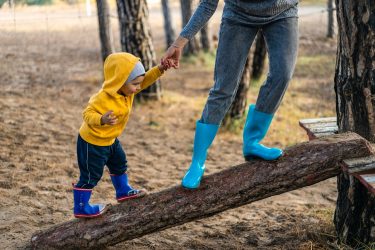 As residents in Washington and much of the nation are confined to their homes and apartments under COVID-19 restrictions, many people are missing their usual “nature escapes”: that hike to a serene lake, a mountain bike trail through the woods, or even a favorite campground by a river where you can relax and recharge.
As residents in Washington and much of the nation are confined to their homes and apartments under COVID-19 restrictions, many people are missing their usual “nature escapes”: that hike to a serene lake, a mountain bike trail through the woods, or even a favorite campground by a river where you can relax and recharge.
As studies have shown – and personal experiences can attest – spending time in nature helps reduce anxiety, improve mental health and well-being, and bolster physical health. In light of stay-at-home orders, University of Washington researchers share that studies also show there is much to be gained from nature close to home, whether in a yard, on neighborhood walks or even indoors.
“Studies have proven that even the smallest bit of nature – a single tree, a small patch of flowers, a house plant – can generate health benefits,” said Kathleen Wolf, a UW research social scientist in the School of Environmental and Forest Sciences. “Look closely in your neighborhood, and the bit of nature you may have taken for granted up until now may become the focus of your attention and help you feel better.”
Thousands of studies have shown nature’s positive impact on health and well-being, even in urban areas and for people living in more confined areas. One study found that a 20-minute “dose” of nature in cities reduced stress levels. Another showed that more tree cover helped lessen symptoms of depression among residents of nursing homes. A study in Sweden found that access to a garden significantly reduced participants’ stress. Access to gardens or views of nature can even reduce the strength and frequency of food cravings.

Residents who have backyards or balconies can replicate these benefits at home by tending a garden or potted plants, sitting in the grass under a tree, walking barefoot, listening to birds sing or even studying a single flower or leaf and contemplating its every curve and feature.
For people who can’t go outside, studies have shown that gazing out a window or looking at nature photos or videos – including virtual tours – are also effective in promoting positive mental health.
A key aspect of accessing these benefits is to bring a level of attention and mindfulness to the activity, something we might not normally do when looking out a window, scrolling through photos or walking down the street.
“It’s important to be mindful, commit to the activity and think about your observations while looking at these materials or elements of nature,” Wolf explained. “That means not merely scrolling through on your computer, but looking at photos or video streams with more intention. It’s essentially nature-oriented meditation.”
 To help with this attuned focus, Wolf recommends journaling or sketching nature you see each day, or forming an online discussion group with friends or family to share nature experiences. It can also be helpful to think back to a specific place or experience in nature where you felt calm, relaxed and rejuvenated. Try to conjure up those memories and share them as stories with others.
To help with this attuned focus, Wolf recommends journaling or sketching nature you see each day, or forming an online discussion group with friends or family to share nature experiences. It can also be helpful to think back to a specific place or experience in nature where you felt calm, relaxed and rejuvenated. Try to conjure up those memories and share them as stories with others.
The relational, social aspect of this process is also extremely important, Wolf said.
“Even though we are physically distancing, it’s really important to our health to maintain our social connections. There is evidence that people who are lonely or who are socially isolated can be prone to poorer health,” Wolf explained. “Nature might be a means, either by being outside a safe distance from others or by sharing stories with each other, of staying socially connected.”
Experiences with nature can slow the mind’s natural process of rumination, in which we fret about the past and worry about the future in potentially destructive ways, explained psychologist Peter Kahn, a UW professor of psychology and of environmental and forest sciences.
“In these times, I think our minds can be a little out of control. Part of the effect of nature is that it can soften negative conditioned mental patterns,” Kahn explained. “If you can find nature, engage with it and get your heart rate down, then your mind begins to settle. When your mind isn’t ruminating, it can then open to a wider world, where there’s great beauty and healing.”
 For those who are able to get outside and move – while keeping the recommended minimum distance of 6 feet between people – physical activity will continue to play an important role in maintaining health, especially in reducing the risk of chronic diseases such as diabetes, cancer and heart disease, said Dr. Pooja Tandon, a pediatrician at Seattle Children’s Hospital and associate professor of pediatrics at UW School of Medicine.
For those who are able to get outside and move – while keeping the recommended minimum distance of 6 feet between people – physical activity will continue to play an important role in maintaining health, especially in reducing the risk of chronic diseases such as diabetes, cancer and heart disease, said Dr. Pooja Tandon, a pediatrician at Seattle Children’s Hospital and associate professor of pediatrics at UW School of Medicine.
“Social distancing is essential and critical, and we have to follow the public health recommendations out there and play our part in supporting our community’s capacity in caring for everyone who is sick or might become sick,” Tandon said during a recent UW webinar about nature and health. “That being said, I think being outdoors and being active can play an important role in promoting our health and preventing disease for when we do emerge from this.”
Tandon encourages healthy people who can practice social distancing to aim for about 60 minutes of physical activity each day for children and 30 minutes each day for adults.
The Nature and Health program at the UW is keeping a running list of ways to engage with nature, including everything from responsible outdoor activities to “zoo cams” and virtual national park tours.








